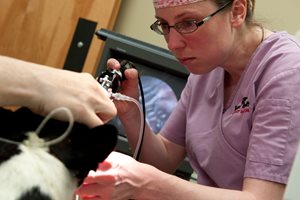With so many animal lovers out there, a frequent question our vets are asked here at Van Isle Veterinary is, “How do I become a veterinarian”? While this is an excellent question… the more important question is, “Why do I want to become a veterinarian?”
The obvious answer would be that veterinarians provide a service to both animals and their owners which can be a very rewarding, fulfilling career. A more personal answer was taken from Mike Beard, DVM, who, when asked why he became a veterinarian, replied: “I could not imagine being happy doing anything else. I get to use my heart, my head, and my hands every day. ” While this is truly an inspiring quote, it points out the fact that it takes more than just a love of animals to become a veterinarian.
So what kind of personal qualities are needed to become a veterinarian? You should be dedicated to serving animal welfare and the human-animal relationship. You should be able to handle stress and endure caring for extremely sick or injured animals for which difficult decisions may have to be made. You must have the physical endurance for long and unpredictable hours. You should also enjoy reading, research, teaching and communication. Helping animals is often accomplished through the humans that care for them and this is why excellent communication skills are vital.
If you feel you meet the personal qualifications necessary to become a veterinarian, what’s next? The first steps begin in high school. You should develop good study habits and work ethics. Concentrate on courses in biology and other sciences as well as math. After high school comes college. Most veterinary applicants have an undergraduate degree which requires 4 years of post-secondary education. Some veterinary schools will accept students after only 2- 3 years of college but these students represent a minority. How you do in college is what gets you into veterinary school, so work hard for those A’s. Veterinary school admission is very competitive with approximately 5 students applying per seat.
Experience in the veterinary field is also important. Not only are volunteer hours required by veterinary colleges, they are also an optimal means of determining how much you will enjoy being a veterinarian and whether you have an affinity for it. Ideally, you would obtain an after school or summer job at an animal hospital, SPCA, pet store, farm, or stable.
Once you have been accepted to veterinary college, the four years at vet school are spent learning all the facets of animal health. From learning basics of anatomy, pathology, pharmacology, physiology and other relevant sciences, to the practical experience, through treating patients in clinics. After completion of your veterinary degree, you will need to pass a licensing exam. Once you are a licensed veterinarian, you have many practice choices. You can work in private practice or specialize in horses, farm animals, exotics or wild life. You may choose to teach or specialize in fields such as cardiology, dermatology or neurology.
There can be disadvantages to being a veterinarian. You are committing to being a lifetime student, with hours that are not always amiable to family life. Often emergency hours are required on top of your full-time job and the work is physically demanding. You can get very attached to both your patients and their families and go through the ups and downs of watching a puppy or kitten grow and the eventual hardships of old age and euthanasia. There will be cases where all your knowledge and all your research is not enough to save your patient. You will help owners grieve and go through the grieving process yourself, sometimes multiple times a day.
However, the advantages to a career in veterinary medicine are endless. Veterinarians do so much more than just help sick animals. They nurse the human animal bond. They help to promote healthy animals, extending their lives and watching them mature. They get to deliver new life into the world and ease the pain and suffering of older animals as they pass into the next life. By doing these things, they get to make the greatest contribution of all…bringing more love and companionship into the world!
For more information on choosing veterinary medicine as a career, start by speaking with your school counselor, local College or University or even contacting your family veterinarian.








Written by Van Isle Veterinary Hospital